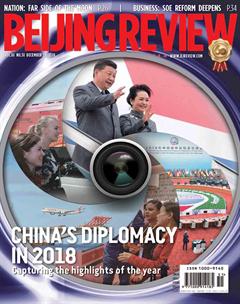A New Voyage
By Li Nan

December 1 marked the start of a golden period for Ji Na and many others like her who love international skin-care products. Preciously, Ji, who lives in south Chinas island paradise Hainan Province and is the host of the annual Miss World pageant, had to buy such goods in a complicated maneuver through agents in Hong Kong. But now she can stock up as much cream as she needs at a cheaper price right at her doorstep.
Thanks to the recently revised duty-free policy in the province, both tourists and local residents can now enjoy an annual duty-free spending of 30,000 yuan ($4,315) per person, almost double the earlier 16,000 yuan($2,301). “The increased amount makes buying foreign goods so much easier in Hainan,”Ji told Beijing Review.
Revising the duty-free policy was the latest move to boost tourism and consumption in Hainan as the island gears up to be the fi rst free trade port (FTP) on the Chinese mainland. At an event marking the 30th anniversary of the founding of Hainan Province on April 13, President Xi Jinping announced that the island would become a free trade zone (FTZ) and ultimately, an FTP.
Hainan will be a national pilot zone for environmental protection, an international consumption center and Chinas key gateway to the Pacific and Indian oceans, according to the general plan for the Hainan FTZ released on September 24. “The dutyfree policy gives global luxury brands easier access to the Hainan and Chinese markets,”Wang Huiping, Deputy Director of the Hainan Provincial Finance Department, said at a briefi ng on November 28.
Eyeing a global presence
Since Xis announcement, Hainan has started taking steps to develop into an FTZ. The duty-free policy will be further enhanced and new districts established to house mega-companies. Also on the agenda is implementing a free trade account system, visa waivers, promoting medical tourism and hosting international conferences. The new free trade account system dispenses with the earlier requirement of maintaining two accounts, one domestic and the other for international transactions.
To woo big companies into pitching their headquarters in Hainan, the local government has designated the 298-square-km Jiangdong New District in Haikou, capital of Hainan, a business area. By the end of November, the government had inked over 200 deals with different enterprises, 21 percent of which are foreign investors. Sixteen state-owned enterprises, including China Travel Service Group Co., have relocated their headquarters to Hainan. The free trade account system, which will provide enterprises a cheaper overseas fi nancing channel, is due to be launched on January 1, 2019. Already, Hainan has waived visa requirements for tourists from 59 countries. By November 29, it had recorded more than 310,000 visa-free visits since May 1.
Becoming an international medical tourism destination is another priority. In 2017, Chinas first international medical tourism hub—Hainan Boao Lecheng International Medical Tourism Pilot Zone—was launched. Located close to the permanent venue of the Boao Forum for Asia Annual Conference, its healthcare services include rehabilitation and cosmetic surgery. Nine preferential policies lowered import tariffs on medical equipment and drugs, as well as extended employment contracts for foreign doctors. Also, foreign investors are now allowed to open hospitals on the island.
“We hope to build Hainan into a worldclass medical tourism destination,” Sun Dahai, Deputy Secretary General of the Communist Party of China Hainan Provincial Committee, told Beijing Review.
In addition, Hainan has taken the initiative to host more international meetings to increase its global recognition. These include the Boao Forum for Asia Annual Conference and the Hainan International Film Festival. The festival debuted in Sanya City on December 9, as an eight-day event with a competition section, film exhibitions and forums, and was attended by industry celebrities from home and abroad.
Hainans advantages
Currently, China has 12 pilot FTZs, so what will be the unique advantage of the Hainan FTZ?
“The whole island will be an FTZ, which will distinguish Hainan from the rest,” Vice Minister of Commerce Wang Shouwen said during a briefing on the blueprint for the Hainan FTZ in October.
The 35,400-square-km Hainan FTZ is 27 times the size of the other FTZs on the mainland. It is 49 times the size of Singapore and nine times that of Dubai. “Turning such a big area into an FTZ is a rare move,” Sun told Beijing Review. He said it would be good for integrating the reform mechanism, building a more intricate and advanced modern industrial system and promoting the overall opening of Hainan.
As the second largest tropical island in China, Hainan has long been renowned for its picturesque landscape and clean environment. “When drawing up the blueprint for the Hainan FTZ, we considered Hainans characteristics and gave priority to healthcare services, tourism and green development,” Wang said.
Most importantly, the Hainan FTZ will upgrade to become Chinas first FTP. So it enjoys 30 more preferential policies than the other FTZs. These are bringing extra benefi ts to its seed, healthcare, telecommunication, Internet, fi nance and marine economy sectors, opening them up wider. As a result, the negative list for market access that specifi es off-limits or restricted sectors to foreign investors in the Hainan FTZ is shorter than the national version, Sun pointed out.
Hurdles ahead
But building Chinas fi rst FTP is not going to be all smooth sailing. “An easy business envi- ronment is needed to facilitate the free fl ow of trade, human resources and funds,” Xu Zhiduan, Executive Director of the Research Center for Chinas Business Environment at Xiamen University, told Beijing Review.
Shen Danyang, Vice Governor of Hainan, outlined three major obstacles at October briefing: an underdeveloped business environment, shortage of talented professionals and the local governments inadequate public service capacity.
To improve its business climate, Hainan has adopted many reforms, including integrating multiple regulations and simplifying the approval procedures for businesses. It has drastically shortened the approval process for projects, reducing the time by 80 percent. In July, the State Council, Chinas cabinet, recognized these efforts as among the 28 best measures nationwide to improve the business environment.
To attract 1 million high-caliber professionals in the next seven years, a recruitment website was launched in June. Within five months, over 29,000 people, including 2,283 foreigners, moved to Hainan. Shen Xiaoming, Governor of Hainan, hosted a job fair in Beijing on November 10, where more than 370 Hainan enterprises offered nearly 7,500 jobs. “We will perfect services for incoming talent, providing preferential treatment for them in housing, healthcare, education for their children and employment for their spouses,” Sun said.
Last but not least, Hainan is optimizing its Internet Plus public service program and has launched a one-stop service platform. Sun said the local government will encourage innovations and award those who come up with effective reform measures.

